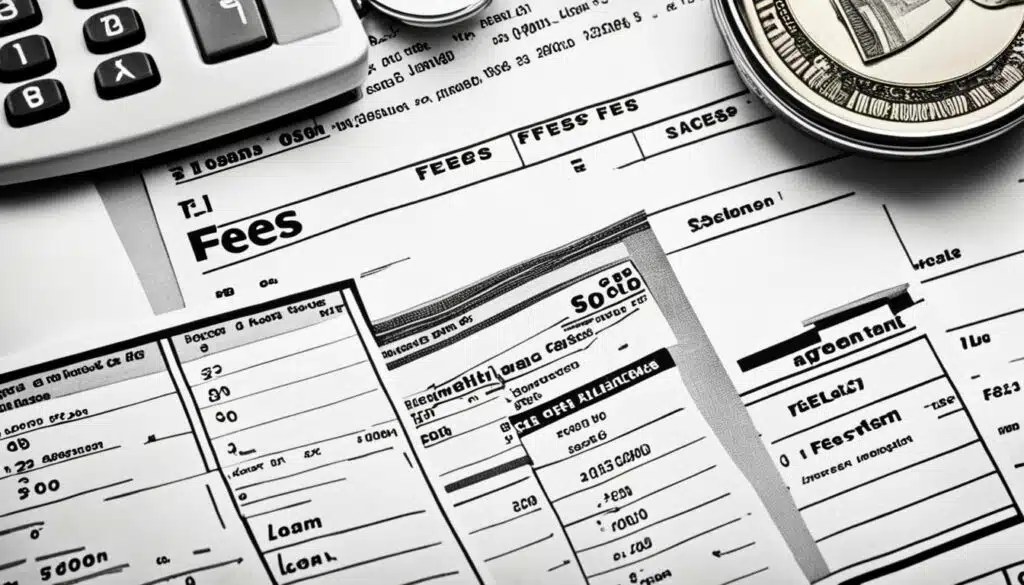Understanding Loan Terms And Conditions: Loans are great for reaching your financial dreams, whether it’s buying a car or starting a business. But before you get too excited about getting a loan, remember to check the fine print. There might be some extra fees hidden in there. These can really bump up the cost of your loan, eating into your savings. So, it’s really important to go through every detail of your loan before you sign off on it.
Key Takeaways
- Loans can have hidden fees that increase the overall cost of borrowing
- Carefully review loan agreements to understand all associated fees and charges
- Compare offers from multiple lenders to find the most competitive overall terms
- Be aware of prepayment penalties and other exit fees that may apply
- Understand the consequences of late payments and how they can impact your credit
Introduction: The Importance of Reading the Fine Print
Getting a loan is exciting, but it’s vital to read the details. Loan agreements often hide extra fees that can raise your total loan cost. These surprises can cost you a lot.
The excitement of securing financing can sometimes overshadow the importance of scrutinizing the fine print. Buried within loan agreements can be a series of “secret fees.” These charges can increase the overall cost of your loan and chip away at your hard-earned money. The saying “the devil is in the details” holds true when it comes to loan agreements. Don’t let yourself fall victim to hidden costs! Before signing on the dotted line, take the time to understand every fee associated with your loan.
The Excitement of Securing Financing
The thrill of getting a loan to buy a car or start a business is real. But it can make us miss the hidden fees. It’s crucial to look closely at the loan agreement.
Hidden Costs Buried in Loan Agreements
There are lots of extra fees in the loan agreement. Things like origination fees and prepayment penalties can sneak up on you. These costs can make it hard to pay back the loan.
The Devil is in the Details
You must read and understand the loan agreement to avoid these costs. Carefully reading the fine print helps you see potential fees and penalties. This way, you can pick the loan that’s right for you. Skipping this step can lead to costly surprises and delays in meeting your financial goals.
Entry and Exit Fees

When you’re thinking about borrowing money, it’s key to know about the fees in your loan agreement. You might face entry and exit fees. These affect the total cost of your loan.
Entry Fees: Origination and Establishment Fees
Before getting a loan, some lenders ask for an upfront fee to process your loan application. This cost is known as an origination fee or an establishment fee. Such fees can be from 1% to 10% of your loan’s amount. It’s common to have these costs, but make sure to compare them carefully.
Exit Fees: Prepayment Penalties
Did you know that some lenders penalise you for paying off your loan early? These prepayment penalties exist to make up for the interest income the lender misses when you pay early. Always check about these penalties upfront, especially if you think you can
Understanding Loan Terms And Conditions: Penalties for Late and Early Payments

Late payments hurt you in two ways. They lower your credit score and make you pay more in late fees. These fees can be a set amount or a part of what you owe. To keep your credit score high, make sure you always pay on time.
Late Payment Fees: A Double Whammy
Falling behind on payments can really harm your finances. It damages your credit and leads to extra fees. These fees might be set or a piece of your existing debt. They all make it tougher to catch up on payments.
Early Payment Incentives
If you pay off your loan early, some lenders will charge you extra. But others might reward you. You could get lower interest or a break on any late fees. Knowing about early payment terms helps you plan your finances wisely. This way, you can save money over time on your loan.
Added Costs Beyond the Loan Amount

Securing a loan is a big step, but watch out for extra costs. Lenders might add products or services that raise your loan’s total cost. These could seem small at first but can really add up.
Credit Insurance: Protection at a Cost
Some lenders will suggest you get credit life or disability insurance. These insurance plans ensure the lender gets paid if you can’t pay due to death or disability. Thinking about your own insurance and financial health before choosing these add-ons is wise.
Account Maintenance Fees: Small but Significant
Lenders might also charge for maintaining your account, be it monthly or yearly. Although these fees might not seem big, they will increase your loan’s cost over time. It’s best to find a loan option with the lowest or no maintenance fees.
Knowing about these hidden loan costs helps you make smarter choices. Always thoroughly check the loan terms and details before agreeing. It ensures you’re truly getting the best loan deal.
Taking Control: How to Avoid Hidden Fees
Loans can seem complex, but you can manage them well. To avoid extra fees, it’s key to go through your loan agreement. Also, shop around for different lenders and ask them any questions you might have.
Read the Loan Agreement Thoroughly
Before you sign, read your loan agreement carefully. This way, you can spot any hidden fees. Pay special attention to charges like origination fees and prepayment penalties. Knowing the loan’s terms and conditions helps you steer clear of surprise costs.
Shop Around and Compare Offers
Never go with the first loan offer you find. It’s important to check out different lenders. Compare interest rates and fees. This ensures that the loan that best fits your budget is what you get.
Also Read : Top Loan Strategies: Maximizing Your Borrowing Power
Ask Questions for Clarification
If something isn’t clear in your loan agreement, ask the lender to explain. Good lenders will answer your questions clearly. Understanding your loan fully is essential to prevent unexpected expenses.
FAQs
Q: What are loan terms and conditions?
A: Auto Loan terms and conditions refer to the specific details and rules outlined in a loan agreement that borrowers must adhere to, including the interest rate, repayment terms, and any fees or penalties.
Q: Why is it important to understand loan terms and conditions?
A: Understanding loan terms and conditions is crucial to avoid hidden fees, accurately assess the total cost of borrowing, and ensure you can meet your obligations as a borrower.
Q: How can I negotiate my loan terms?
A: You can negotiate your mortgage loan terms by discussing with the lender aspects such as the interest rate, repayment schedule, or fees to potentially secure better conditions that suit your financial situation.
Q: What is the difference between the term of the loan and the type of loan?
A: The term of the loan refers to the duration over which you repay the loan, while the type of loan indicates the category of the loan, such as a personal loan, business loan, or mortgage.
Q: What are some common terms included in a loan agreement?
A: Common terms in a loan agreement may include the repayment schedule, interest rate, loan amount, collateral requirements, default consequences, and any additional fees or charges by monthly payment.
Q: How can I secure the best loan terms and conditions?
A: To secure the best loan terms and conditions, it is important to compare offers from different lenders, negotiate terms when possible, and ensure you fully understand and agree with all aspects of the loan agreement before signing.
Q: What should I know before signing a loan agreement?
A: Before signing a loan agreement, make sure you thoroughly review and understand all the terms and conditions, including the repayment terms, interest rate, fees, consequences of default, and any other obligations associated with the loan.





